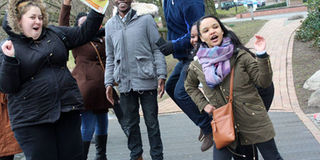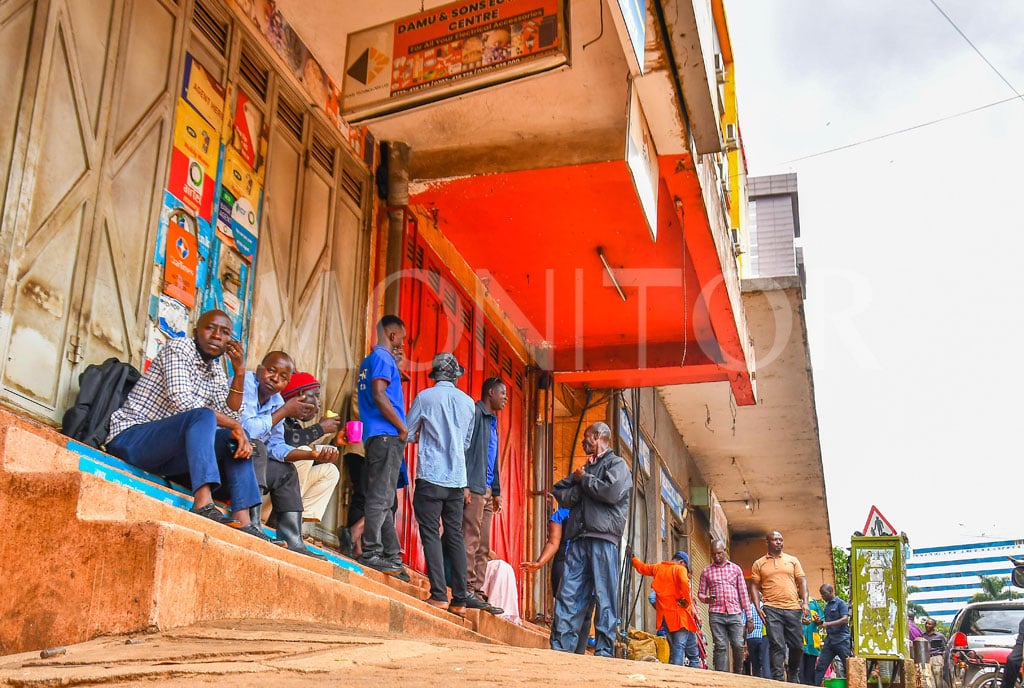Student flying Uganda Flag in Norway

Henry Mutebe (centre) with some of his classmates. COURTESY PHOTO.
What you need to know:
- A few weeks ago, Henry Mutebe was elected to the Student Parliament of Oslo and Akershus University College of Applied Sciences in Norway. Even though he does not speak, Norwegian (Norsk), the language spoken by Norwegians, he intends to make a mark.
- Profile: Henry Mutebe
- Background: Born on October 10, 1986 to the late John Kitimbo and Jane Baitanunga. He is married to Caroline Kemigisha and they have two children.
- Education: He studied at Namalemba Boarding Primary School in Iganga District and Kiira College Butiki. He joined Kyambogo University in 2006 to study Development Studies on government sponsorship.
- Work: In 2009, he graduated from Kyambogo University with a degree in Development Studies and was retained as a lecturer at the same university.
Henry Mutebe can only describe his election as a humbling experience.
In the campaigns, at Norway’s largest state university college, he stood against students who could speak Norwegian, and had to convince the electorate of his abilities.
“Being elected is a balancing act; playing an intermediary role between students and administrators,” says the 30-year-old who was born in Namisambya village, in Kamuli District.
“It is like being the first egg in the omelet. If it goes right, you all celebrate. If things do not work out, then you take the biggest share of the blame,” he adds.
A few months ago, in the summer, Mutebe had been elected president of the international student’s body at his university. The multicultural body has 1,000 students from over 63 countries. Although this position allowed him into the Student Parliament, he could not vote.
“My motivation to run for parliament was to gain the leverage to vote. Student parliamentarians seat on 20 per cent of all institutional boards at the university. I wanted to access that space and give voice to issues concerning international students.”
Mutebe takes inspiration from his grandmother, Idha Nkoobe, one of the first female sub-country chiefs.
“I spent my childhood with her and got interested in women issues. I have done some work supporting women and children and I think our society is like a bird flying with one wing because of the way we treat women,” he says.
Because his mother travelled a lot, Mutebe attended many schools. However, one school left a lasting impression on him; Kiira College Butiki where he spent six years.
In 2009, he graduated from Kyambogo University with a degree in Development Studies and was retained as a lecturer. “On my first day at work, when I entered the lecture room, a student walked up to me and whispered, ‘What time do you think the lecturer is coming?’ I whispered back, ‘He is already in class.’ Astonished, the student asked where he was and I replied, ‘He is the one you are talking to.’ He ran back in utter shock. It was always fun handling first year students.”
Before leaving for Norway, Mutebe was studying Law at Makerere University. In 2015, he put his studies on hold until his return from Norway.
He had secured four scholarships but he settled on Norway because he wanted a two-year programme with a strong research component.
His plans in parliament
Mutebe says it is premature to talk about what he hopes to achieve in the Student Parliament, but many international students at the university have been inspired by his courage to run for parliament. “I laid the first brick upon which others can build. I have proved that Norwegians welcome everyone if they front a good agenda. Norway is an open society that celebrates diversity.”
As president of the international student’s body, Mutebe travels a lot. “I meet people of different backgrounds and influence and I use my position to benefit every student. I talk about Uganda everywhere I go and I have interested many Norwegians to visit Uganda.”
Most university programmes, including the parliament, are run in Norsk. The graduate programmes, though, are in English. This means international students are left out.
Mutebe’s win has set in motion developments aimed at making the parliament more inclusive.
“I have received assurance from the administrators that they are making adjustments to ensure that I am able to hear and understand everything. The material so far sent to me is translated into English and they will install equipment that will give me a live feed translation. All Norwegians in the student parliament speak English; however, some have difficulty expressing themselves.”
Future plans at the university
Mutebe plans to stand for vice president of the parliament at some future date. “In Norway, education is tuition free, from kindergarten to PhD level regardless of nationality.
However, over the last year, some politicians have been discussing the idea of introducing tuition fees for international students.
This plan may be disastrous for poor students from the global south. Last year, we expressed our concerns and the issue was shelved. However, we cannot afford to rest.”
Student life in Norway
According to Mutebe, a haircut that would cost Shs5,000 in Kampala costs the equivalent of between Shs150,000 and Shs200,000 in the cheapest salons. “Women need, at least, the equivalent of Shs500,000 for a salon visit. Life is quite tough.”
Another challenge is learning the language. “It is not an easy language. There are extra vowels which have different sounds and words do not sound the way they look.
Profile: Henry Mutebe
Background: Born on October 10, 1986 to the late John Kitimbo and Jane Baitanunga. He is married to Caroline Kemigisha and they have two children.
Education: He studied at Namalemba Boarding Primary School in Iganga District and Kiira College Butiki. He joined Kyambogo University in 2006 to study Development Studies on government sponsorship.
Work: In 2009, he graduated from Kyambogo University with a degree in Development Studies and was retained as a lecturer at the same university.
Research
Future plans
Mutebe is working on a project that will see children in eastern Uganda receive quality education through building partnerships with schools in Europe.
“We are building an information resource centre where children will learn about space, science and technology, and be inspired to dream beyond their villages. This center will give access to teachers to research, design and develop learning materials.”
Mutebe’s goal is to remain in academia and contribute to research and teaching; and to continue motivating women and youth groups.




